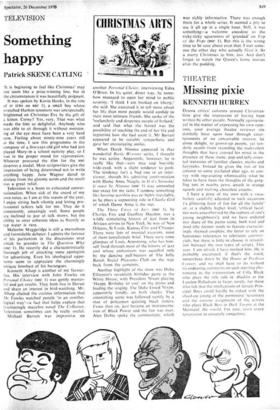CHRISTMAS ARTS
TELEVISION
Something happy
Patrick SKENE CATLING
`It is beginning to feel like Christmas' may not seem like a prize-winning line, but in the circumstances it was beautifully poignant.
It was spoken by Kevin Hooks, in the role of JT (CBS on BBC ), a small boy whose wretched Harlem tenement was unexpectedly brightened on Christmas Eve by the gift of a kitten. Corny? Yes, very. That was what made the film so delightful. Anybody who was able to sit through it without moisten- ing of the eye must have been a very hard case. Feeling about ninety-nine years old at the time, I saw this programme in the company of a five-year-old girl who had just played Mary-in a school nativity play, so I was in the proper mood for rejuvenation. Whoever procured the film for the BBC deserves a medal. Most scriptwriters give the impression of being determined not to write anything happy. Jane Wagner dared to deviate from the gloomy norm and the result was a great relief.
Television is a boon to exhausted conver- sationalists. When sick of the sound of my own voice, as I am at this season of the year, I enjoy sitting back silently and letting pro- fessional talkers talk for me. They do it consistently, amazingly well. Some people are inclined to jeer at talk shows, but the ability to utter coherent ideas as fluently as tap water is rare.
Malcolm Muggeridge is still a marvellous and formidable debater. I admire the fervour of his puritanism in the discussions over which he presides in The Question Why- (Bac 1). He recently did a characteristically thorough job of attacking some apologists for advertising. Even his ideological oppo- nents seem to appreciate the charmingly antique bombast of his harangues.
Kenneth Allsop is another of my favour- ites. His interview with John Fowles on Personal Choice (Bac 1) was gently master- ful and got results. They both live in Dorset and share an interest in bird-watching. Mr. Alisop elicited the curious information that Mr Fowles watched people 'in an ornitho- logical way'—a fact that helps explain that fascinatingly macabre novel The Collector. Television sometimes can be really useful.
Michael Barratt was impressive on another Personal Choice, interviewing Edna O'Brien. In his quiet, direct way, he some- how managed to open her mind to public scrutiny. think I am hooked on liberty.'
she said. She exercised it to tell more about her life than most people would confide to their most intimate friends. She spoke of the 'melancholy and desperate people of Ireland.'
and said that what she feared was the possibility of reaching the end of her life and regretting how she had spent it. Mr Barratt appeared to be suitably sympathetic and gave her encouraging smiles.
When Derek Nimmo appeared in that wonderful Bertie Wooster series. I thought he was acting. Apparently, however, he is really like that—very nice and boyishly wide-eyed. with a slight tendency to gush.
The tendency isn't a bad one in an inter- viewer. though his admiring confrontation with Dame Anna Neagle. in If it's Saturday
it must he Nimmo (Bac 1) was somewhat too sweet for my taste. I suppose something like heroine-worchin was pr^bably inevitable. as he plays a supporting role in Charlie Girl of which Dame Anna is the star.
The Three Faces of !az: (aBc by Charles Fox and Geoffrey Haydon. was a wildly stimulating history of jazz from its African origins to New York. by way of New Orleans,.St Louis. Kansas City and Chicago. There were lots of musical excerpts, most of them tantalisingly brief. There were some.
glimpses of Louis Armstrong, who has him- self lived through most of the history of jazz and whose enthusiasm was equalled only by the dancing pall-bearers of The Jolly Bunch Social Pleasures Club on the way back from the cemetery.
Another highlight of the show. was Duke Ellington's seventieth birthday party at the White House, with President Nixon playing 'Happy Birthday to you' on the piano and
leading the singing. The Duke kissed Nixon, apparently fondly, on both cheeks. That astonishing scene was followed nastily by a shot of policemen quieting black rioters. From then on, jazz became an instrumenta- tion of Black Power and the fun was over. Alan Dobie spoke the commentary, which was richly informative. There was enough there for a whole series. It seemed a pity to use it all up in a single hour. Still, it was something—a welcome anecdote to the ricky-ticky squareness of `grandad' on Top of the Pops (Bac 1). But this is the wrong time to be sour about even that. I met some- one the other day who actually liked it. So a merry Christmas to him, too. And don't forget to watch the Queen's home movies after the pudding.


















































 Previous page
Previous page